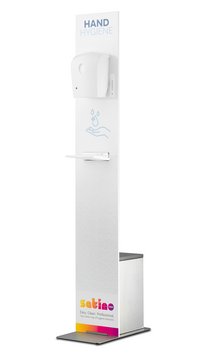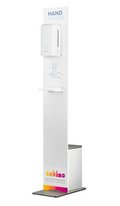
Sanitiser stand XL
SF3 compatible
Especially for high-traffic areas: the robust and economical solution for hand hygiene in public spaces. The battery-operated sanitiser stand with sensor dispenser is supplied by the Satino by WEPA OEM 5-litre canister*. The RFID-tracked original Satino by WEPA canister enables simple checking of the fill level.
* Use biocidal products carefully. Always read the label and product information before use.
Highlights
- Touch-free hygiene and maximum protection thanks to Satino sensor dispenser
- LED filling level indicator
- Battery-operated
- Easy to clean due to anti-fingerprint coating
- Integrated drip tray
- Including handle for convenient handling
- Lockable storage compartment for consumables in the base of the stand
- approx. 1,562 applications at 3 ml (SF3 – only OEM canisters from Satino by WEPA)
- For use of Satino by WEPA sanitiser liquid, sanitiser gel or Sensitive sanitiser liquid in the original Satino by WEPA 5-litre canister
Available in these countries
Art. no.: 333000
Sell-OutFor hygienic hand disinfection, approx. 3 ml of disinfectant is placed in cupped, dry hands and rubbed and distributed on the hands for the specified reaction time according to the standard method (EN 1500). The hands must remain moist for the entire reaction time, otherwise more hand disinfectant must be applied. Do not dry hands afterwards.
Washing hands with soap and water is the most important component of hand hygiene outside of medical facilities. It removes visible dirt and – if hands are washed methodically and for about 20-30 seconds – bacteria or viruses. Hand drying also plays an important role. Hand drying with paper towels is proven to be the most hygienic method as there is no excessive aerosol formation. It is especially important to dry the hands completely, as residual moisture on the skin facilitates the transmission of microorganisms.
Hand disinfection specifically kills microorganisms and thus reduces the probability of infection or transmission of pathogens through the hands.
Both hand washing and hand disinfection are therefore suitable for breaking chains of infection.
Both Satino disinfectants are available in the sizes SF1 (1,000 ml) and SF2 (700 ml) for the wall dispensers and the disinfection stand -large-, as well as in 5-litre canisters (SF3) for the disinfection stand -extra large-.
Satino disinfectants have a “limited virucidal effect”, which means: they are effective against all enveloped viruses. These include – besides measles, mumps or herpes viruses – the novel coronavirus SARS-CoV 2. A prerequisite for effectiveness is that the specified reaction time is observed.
Both products contain lipid-replenishing and skin-friendly ingredients that are much less stressful to the skin's protective acid mantle than water and soap. Those who frequently have to pay attention to their hand hygiene at work should not wash their hands too often, but use hand disinfection products.
Hand disinfection is useful wherever hand washing is not possible and where contact infections can occur, for example through shared handrails, handles or touch screens. However, heavily soiled hands should, if possible, be washed before hand disinfection.
The Satino disinfection stands were designed for use in closed areas; the electrics/electronics or the display are not water-resistant. We advise against placing them under canopies or otherwise protected outdoor areas, as there is a risk of theft or vandalism.
Both Satino disinfection stands are self-sufficient, operate energy-efficiently and are powered by batteries. The disinfection stand -large- for medium frequency of use (333010) can alternatively be connected to the mains via a USB connection. Batteries are included with both stands.
The disinfection stand -large- can be connected to the power supply via a USB interface.
With the disinfection stand -extra large- an external power supply is not possible: this stand (333000) is designed for rooms with high frequency of use and is equipped with a long-life 5-litre Satino canister. We also assume that this stand will be placed centrally in larger rooms with increased public traffic where a power cable would constitute an obstacle to walking and a trip hazard.
Size SF1 (1,000 ml) is sufficient for app. 1,666 single doses, size SF2 (700 ml) for app. 1,166 single doses; both can be used in the disinfection stand -large-. The disinfection stand -extra large- (333000) is equipped with the Satino 5-litre canister; here the capacity is app. 6,250 single doses.
| Product | Canister | Bag | Bag |
|---|---|---|---|
| Content [ml] | 5,000 | 1,000 | 700 |
| Number of hand disinfections per container | app. 1,562 | app. 333 | app. 233 |
The battery life of the disinfection stand -large- allows for app. 23,000 single doses; app. 12,500 single doses for the disinfection stand -extra large-. Conversely, the batteries of the disinfection stand -large- last for more than 13.8 (SF1) or 19.7 (SF1) refill bags; for the disinfection stand -extra large- it is 2 canisters.
Officially, it is proved in Germany to use 3-5 ml, which is roughly equivalent to a cupped hand. Effectiveness according to EN 1500 is stated for 3 ml. This is the European standard, but national authorities’ information may differ slightly. According to the guidelines of the Dutch RIVM (Rijksinstituut voor Volksgezondheid en Milieu), roughly 4 ml of disinfectant are required. This is a little less than a teaspoon.
Disinfectant liquid and disinfectant gel have the necessary efficacy certificates such as EN1500 and an approval from the CTGB in the Netherlands. The Satino disinfection liquid -sensitive- product series is not registered in the Netherlands.
Yes, four AA batteries (1.5 V) are included with each stand. They must be inserted into the removable battery compartment at the top of the dispenser to commission the stand.
No, the Satino disinfection stands are delivered completely pre-assembled. Once the supplied batteries and disinfectant are inserted, the stands are immediately ready for use.
The canister is a Satino-exclusive convenient all-in-one system that is equipped with an integrated RFID chip: this allows the LED display installed on the stand to show the filling level in the canister – for cleaning staff or users, for example. The Satino canister must be replaced as a whole.
The enclosed instructions for use explain how to handle the stand and how to replace the disinfection canister. Furthermore, it refers to the Satino OEM filling material.
New production lots of the disinfections stand -extra large- contain an additional sticker in the lid of the stand which informs about canister handling and replacement.
For the disinfection stand -large- (333010) with the disinfection bags SF1 and SF2 there is an LED on the bottom of the dispenser. At a voltage of 3.8 V the indicator starts flashing, below 3.5 V the dispenser no longer works and the indicator lights up permanently red. This is similar with the disinfection stand -extra large- (333000): it features an LED display in the front. If the battery is running low, it lights up – a battery change is then advisable before the LED gives a permanent red warning and the dispenser stops functioning.
With the disinfection stand L (333010), the dispenser is ready for immediate use.
With the XL stand (333000), about 35 pump strokes are required upon new installation or canister change. The reason: the disinfectant has to find its way from the canister (base of the stand) to the dispenser, covering a distance of approx. 1.20 m.
We point this out with a sticker on the dispenser.
As an alternative to the sensor, the pump can also be operated by hand. This is necessary for every new installation, i.e. when inserting a new 5-litre canister.
Yes, consumables can be stored and locked away in the base of both Satino disinfection stands.
The disinfection stand -large- (333010) uses the standard Satino dispenser key.
The disinfection stand -extra large- (333000) uses a special dispenser and therefore a special key due to its RFID technology.
Caution: The dispenser key and the key to the base of the stand (5-litre canister) are not identical.
Both stands have an integrated handle so that they can be used elsewhere if required.
Both hand disinfectants are available as gel or liquid and in the skin-friendly sensitive variant in the 5-litre Satino canister (not in NL) and can be used with the disinfection stand -extra large-.
Both disinfection stands are equipped with their own drip trays as standard.
For the standard Satino soap dispensers (331100/331060/331530/331540) we will also have a drip tray available from May 2021: the Satino by WEPA Drip Tray 333050 for separate installation.
The stands are currently not suitable for kindergartens or for younger pupils. Firstly, the disinfectant dispenser is located at a height of 1.40 metres and is thus clearly designed for adults. On the other hand, disinfectants should not be available unsupervised near children; used incorrectly, they can cause eye irritation, for example.
With the disinfection stand -large- the filling level of the bags inside can be seen through the inspection windows on the sides. The disinfection stand -extra large- has an LED display in the front: when “pressing” the LED display, the LEDs indicate the current filling level of the canister.









